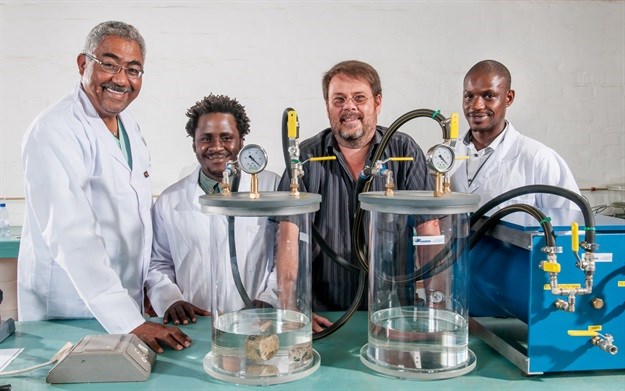
The facility will also double up as a skills development centre where graduate engineers in SANRAL’s experiential learning programme can get invaluable exposure to and even focus on materials engineering.
The civil engineering materials testing lab enables SANRAL to test the properties of construction materials used in road maintenance activities as well as in development and upgrading of the national roads. It will also give SANRAL a second-tier quality assessment tool through comparative or correlation tests done independently from, but concurrently with, the tests of site material labs conducted on conventional road engineering projects in the province.
“Having an independent comparison is widely regarded as one of the most valuable tools to check the site lab’s accuracy,” says Sean Strydom, SANRAL southern region materials specialist. “The accuracy of test results have a significant impact on whether we accept or reject the quality of work in our efforts to deliver roads that are in line with international standards. Any additional assurance of the accuracy is of great value.”
“Through this initiative, we will be able to ensure that remote site material labs are compliant with the quality management standards similar to what is required for the accreditation of a materials testing labs through the South African National Accreditation System (SANAS),” he says.
The new engineering materials laboratory consists of testing facilities to determine the properties of soils and gravel, asphalt, concrete and bituminous binders. On a more advanced level, the lab has been equipped with a Dynamic Shear Rheometer to understand the viscoelastic behaviour of binders used is seal and asphalt surfacing, at medium to high temperatures.
Other testing infrastructures will allow SANRAL to conduct oxygen permeability, water absorptivity and chloride conductivity tests on high durability concrete. In terms of geotechnical testing, drained and undrained triaxle testing on undisturbed or reconstituted samples which will be of huge assistance in the monitoring of potentially unstable slopes along the national road network in the region.
The new road material testing facility will also serve as a training facility where SANRAL’s Centre of Excellence students can build their understanding of materials engineering through practical experience. The centre currently houses 26 engineering graduates from across South Africa on a three-year in-house experiential training programme, which will assist them to be able to register as professional engineers.
“From a developmental perspective, it is critical to ensure that South Africa’s future engineers have a fundamental understanding of the properties of the materials used in road infrastructure development,” says Simon Peterson, SANRAL southern region manager.
“The current generation of senior engineers was deployed to commercial or provincial laboratories after they complete their studies. It was very much part of the development plan at that time. Unfortunately, as time progressed, disinvestment in road materials testing facilities occurred. In fact, only one provincial road materials testing facility in the country has maintained its SANAS accreditation,” said Peterson.
“The idea is for upcoming engineers, who are enrolled on our three year experiential training programme, to spend between three and four months at the road materials testing lab,” he said. “The graduates will be doing hands-on testing, and they will be guided to understand the limitations of road material tests in terms of the methods and the interpretation of the results.”
According to Strydom, there are also plans on the cards to use the facility for the summative assessment of a new road materials testing qualification which is currently being developed with sponsorships from the Southern African Bitumen Association (SABITA) and SANRAL.
“As an additional spin-off, our lab can be used as an assessment centre for the new materials testing qualification. The summative assessment is the evaluation of a practical skills set, and tests have to be conducted before an assessor. Preparation of the equipment and materials used for the evaluations and the evaluation itself can take place at this lab,” he said.